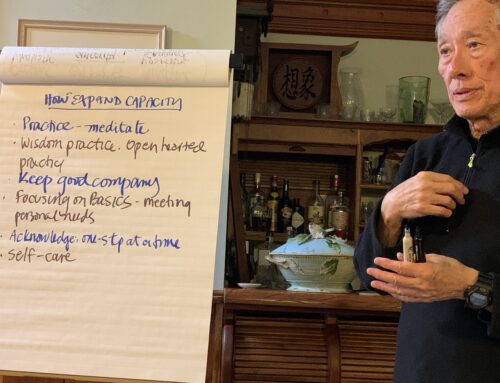
Image by Alexander de Cadenet
It’s become quite evident to me lately that many people have a misperception of what mindfulness meditation is. Most commonly, there is a sense that it is a form of escape. So, in order to help clarify things a little, here is a list of what mindfulness meditation is not:
- It is not an attempt to ignore pain. Quite the contrary: it can be a journey into pain, to see what is really there. A core component of mindfulness meditation is single-pointedness, in which we aim to use one sense to focus our attention on one thing. If pain is being experienced, this can be an excellent thing to put our focus on.
But—and this is very important—we are not putting our focus into reducing the pain. We’re not trying to do anything to the pain; all we’re doing is noticing the sensation with curiosity. Noticing with curiosity: that’s mindfulness meditation in a nutshell.
Now, it’s true that studies have demonstrated that mindfulness meditation reduces pain, but it’s very important to realize that we don’t meditate with the expectation of reducing pain; we meditate with the intention of developing focused awareness. It is through the focused awareness that we begin to experience the pain differently, not through any attempt to reduce the pain. - It is not an attempt to ignore distractions. I participate in a weekly sit in a community center. We’ve had loud conversations outside the door; kids playing; toilets flushing; we’ve had cell phones go off in the middle of the sit. And on some days, all of these things seem to happen! Remember what mindfulness meditation is: noticing with curiosity. Now, meditate on the impact judgment has on curiosity . . . . that’s right: judgment kills curiosity.
So when I judge against distractions, what I’m effectively doing is destroying my practice in that moment. A teacher of mine once said—immediately after a whole bunch of plates crashed to the floor—”Ah, the sound of God.” Whether or not you believe in God, this remains essentially the experience of someone practicing mindfulness meditation effectively: whatever arises is to be noticed with curiosity and without judgment. It’s all God; it’s all good. - It is not an opportunity for a nap. Which, of course, is not to say you won’t start nodding off. Sleep has pursued every experienced mindfulness meditator through many a meditation. And just as we don’t attempt to avert the pain, we also don’t attempt to crave the sleep. We notice our sleepiness with curiosity. We attempt to remain detached, thereby not getting caught up in the story of tiredness. As with anything that arises as we sit in silence, our job is only to watch.
- It is not an opportunity to think things through. In mindfulness meditation, we are attempting to clear our mind, not fill it up. We attempt to sit and notice our thoughts: notice what they do, how they arise, how they fade away; we aim to remain detached from them—just watching, watching, watching. And we find, the less we identify with our thoughts, the clearer our mind seems to get. And with a clear mind, with nothing to think about, we find ourselves in a supreme spaciousness, where solutions arise far more readily than problems.
- It is not an opportunity to experience deep peace. Although this can often be experienced during mindfulness meditation, it is by no means the goal of the practice. The goal of the practice is to notice with curiosity, without judgment. The result can be very peaceful. And, quite often, you may find yourself lost in thought, or experiencing pain, or feeling sleepy, or constantly distracted—and all of these are perfectly valid experiences, too. The practice is the noticing; what arises is what we notice without judgment. When we enter our meditation with an expectation, then we stop noticing and start expecting, preparing, manipulating.
So drop the expectation, and enter into your next meditation with just one intention: to notice, with curiosity and without judgment.
Because explaining what mindfulness meditation is, is so much more straightforward than explaining what it isn’t.



Have you ever thought about creating an ebook or guest authoring on other blogs?
I have a blog based upon on the same topics you discuss
and would love to have you share some stories/information. I know my subscribers would appreciate your work.
If you’re even remotely interested, feel free to
send me an e mail.